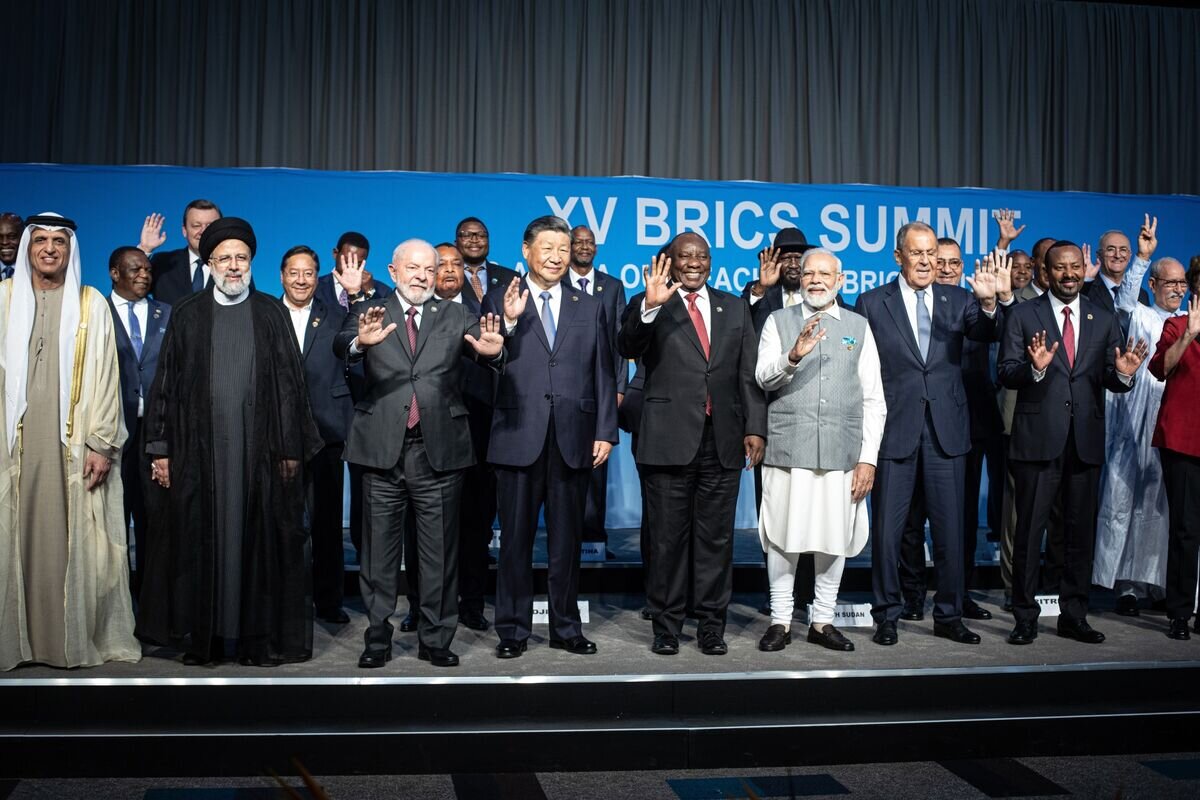BRICS: new era for Iran
Iran to become full member of BRICS as of January 2024

TEHRAN – Iran is among the six countries that on Thursday were invited to fully join the BRICS group of emerging economies.
During a BRICS summit held in Johannesburg, South African President Cyril Ramaphosa announced the BRICS member states have agreed to admit Iran, Argentina, Egypt, Ethiopia, the UAE and Saudi Arabia as full members. That means the bloc currently consisting of Brazil, Russia, India, China and South Africa, will double in the number of members as of the beginning of next year.
Iranian President Ebrahim Raisi who traveled to South Africa to attend the summit has called the advantages of Iran's membership in the bloc “history-making”.
“Strategic cooperation between Iran and BRICS members in the fields of transit, energy, and trade, will support the BRICS global agenda. The Islamic Republic of Iran strongly supports the successful efforts of BRICS in the path of de-dollarization of economic relations between members, the use of national currencies, as well as the strengthening of BRICS mechanisms for payment and financial settlement,” Raisi told the BRICS summit.
Other Iranian officials have also reacted to the announcement. Foreign Minister Hossein Amir Abdollahian has lauded the bloc for deciding to move towards expansion. “In addition to strengthening multilateralism, the great success of accepting Iran’s membership in BRICS can provide the basis for the pursuit of goals and the development of other macro strategies of the government in the implementation of dynamic diplomacy,” said the top diplomat on X.
Iran’s membership in BRICS is significant from both a regional and international perspective, Ali Akbar Velayati, a senior advisor to the Leader of the Islamic Revolution, said in an interview. Velayati added that the BRICS group can act as a counterweight to the U.S. hegemony and help create a more just economic system.
How can BRICS membership aid Iran?
The current BRICS countries collectively represent around 40% of the global population and a quarter of the world’s gross domestic product (GDP). Iran’s economy has been saddled by unilateral U.S. sanctions in recent years. With BRICS allowing the use of local currencies in monetary transactions, Tehran can trade with other member countries more freely as it no longer needs to rely on the U.S. dollar for financial affairs. This can gradually help alleviate pressure on the country’s economy and eventually make the effect of U.S. sanctions die out.
Iran’s full membership in the body also means that the West has not been able to reach the primary goal of its sanctions which was to make Iran isolated. Membership in BRICS is another diplomatic achievement by Iran that harks back to other recent accomplishments of the country including a Shanghai Cooperation Organization membership, a reconciliation deal with Saudi Arabia, and a deal with the U.S. to free Iranian assets. Iran has been prosperous on the diplomatic stage despite years of nonstop pressure. It seems it is finally safe to say that the so-called “maximum pressure” campaign against Iran has failed to bear fruit in a meaningful way.
End of an era
The U.S. has been using the dollar’s dominance to impose political agendas. Iran got to experience the harsh reality of today’s economic disparity early on but following tensions growing between China and Russia with the West, it seems that more countries have started to think of dethroning the dollar.
The president of Russia, who had half of his country’s foreign currency reserves blocked in Western banks in 2022, said the process of de-dollarization is “gaining pace” and is “irreversible” during the recent BRICS summit. “A balanced, irreversible process of de-dollarization of our economic ties is gaining steam, with efforts undertaken to develop efficient mechanisms of mutual settlements, as well as monetary and financing control. As a result, the share of the dollar in export and import transactions within BRICS is declining as it only equaled 28.7% last year,” said Vladimir Putin while addressing the gathering virtually.
While Western media has been trying to downplay BRICS’ potential, it is important to note that the bloc surpassed the global GDP contribution of the G7 countries in 2023 and now accounts for nearly 1/3 of the global economic activity.
Even if BRICS fails to create a common currency like the European Union, as Brazilian President Luiz Inacio Lula da Silva stated earlier this year, different countries can use their own currencies during trade and ditch the U.S. dollar. The process of de-dollarization is not going to happen tomorrow as currently the U.S. dollar is estimated to be used in more than 80 percent of international trade. But blocs like BRICS and their tendency for economic diversification means such a future might be here later than desired, but is sure to come.
The bypassing of U.S. economic policing seems to have crossed the minds of countries other than Iran, China and Russia as so far more than 40 countries have expressed interest in joining BRICS, and 23 have officially applied to join the club.
A more just economic system will also secure independence for different countries as the U.S. might lose the most significant aspect of its hegemonic power, the dollar’s dominance. You can only abuse your power so many times before others start to think of ways to sidestep you.
The recent military developments of U.S. rivals and Washington falling behind in the production of high-technology hypersonic missiles signals another aspect of the West’s faltering influence. Analysts believe in the decades to come Westerners will continue to be a pillar of power but will no longer be the determining force in every scenario. In short, the world is moving towards a multipolar system and it seems impossible for the U.S. and its allies to roll back achievements in this regard.
Leave a Comment